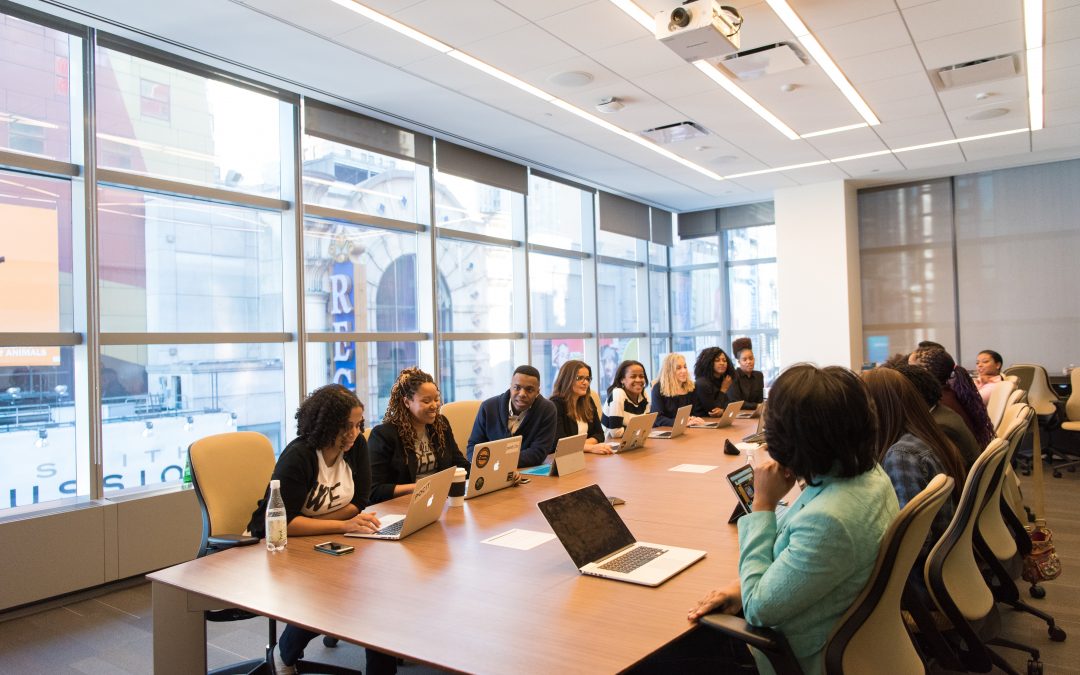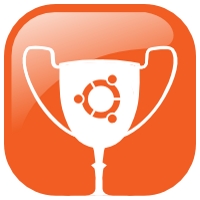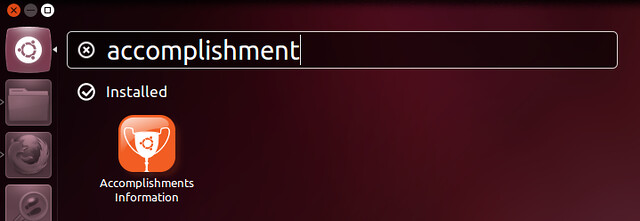
First Ubuntu Accomplishments Release

Back in January I [first posted](https://archivedblog.jonobacon.com/2012/01/23/hacking-on-accomplishments/) about initial progress on the Ubuntu Accomplishments project; an effort to present our users with fantastic documentation and guidance for a range of different community activities and automatically award our users with trophies when they accomplish those activities. The end-goal is to make opportunities on your computer and in your community more discoverable and satisfying when accomplished.
Importantly, *Ubuntu Accomplishments* is *not* about meaningless awards such as *1000 posts to a forum* or *500 bug comments* (the like of such can be easily gamed and generate too much noise to signal), but we are instead focusing on awards for new experiences and skills acquisition (e.g. learning how to file a bug, becoming an Ubuntu Member etc). You can see our guidelines for how we decide on what makes a great accomplishment [here](https://wiki.ubuntu.com/Accomplishments/Creating/Guidelines).
Well, after a furious period of development, I am delighted to announce our very first release: **Ubuntu Accomplishments 0.1**. This first release is a huge milestone in the project: this isn’t just a small GUI app…to build this first milestone involved creating a back-end service (featuring a DBUS API), a Python API to ease writing accomplishments, a server validation service, a graphical front-end, and a collection of community accomplishments to get people started. In addition to this everyone’s favorite Callé…David Callé…has created a Unity lens for the system which we plan on releasing over the next few days too.

Currently the 0.1 release does the following:
* Browse a range of different Ubuntu Community opportunities and filter them based on different categories.
* Click on different opportunities to discover more about them, what is involved, how to get started, as well as tips and tricks for success.
* Some opportunities require others to be completed before you can progress: this provides a logical on-ramp for participation.
* Accomplishments are automatically checked to see if you have achieved them. If you have they are verified to ensure they can’t be faked.
* The GUI client shows your collection of accomplished trophies as well as the available opportunities.
* Comprehensive Unity integration featuring Launcher numbering, notification bubbles, and hi-resolution icons.
* Full translated and available in a range of languages (language support varies due to the early nature of this release…but you [you can help translate it](https://archivedblog.jonobacon.com/2012/04/28/translation-help-needed/)!).
* We also provide a collection of community accomplishments covering Development, LoCo Teams, Juju, Governance and more. We need more accomplishments contributing and I will be talking more over the next few days about how you can contribute.
The goal of the 0.1 release was to demonstrate the core system working and I am delighted to share this first release with you.
## Installing
*Please note, there is a reason why this is version 0.1 – this is a very early version, so use with caution. There are bound to be some bugs, but we welcome all testing so we can resolve bugs and problems. Thanks!*
The 0.1 release is only available for **Ubuntu 12.04** and is available in a PPA. You will need to have an [Ubuntu One](https://one.ubuntu.com) account set up and working (you don’t need a paid account, just the free account).
You can install the PPA by following these instructions.
First, add the PPA to your system with:
sudo add-apt-repository ppa:ubuntu-accomplishments/releases
Now update your package list:
sudo apt-get update
Now install the packages:
sudo apt-get install accomplishments-daemon accomplishments-viewer
ubuntu-community-accomplishments
To use the system simple click on the *Accomplishments Information* app in the Unity dash. The graphical app will load and if you wait a few minutes you should start seeing notification bubbles arriving that tell you which trophies you have achieved.
You can browse the Opportunities by double-clicking on them to read more about them. You can view your collection of trophies by clicking on *My Trophies*.
### Known Issues
A few known issues with this first release:
* Unicode decode crash – we have had a report of a translation causing a crash when clicking on an opportunity to view it.
* You have to start the GUI to start the back-end process. This will be started on login in the future.
## Reporting Bugs
If you find a bug you can report it [here](https://bugs.launchpad.net/ubuntu-accomplishments-system/+filebug). We are keen to know about all bugs you find!
## Thanks
I just want to offer thanks to the following people who helped get this 0.1 release out:
* Rafal Cieslak
* Stuart Langridge
* Matt Fischer
* Duncan McGreggor
* David Callé
* Simon Watson
Thanks!
## Next Steps
Moving forward we want to focus on these areas:
* Growing our range of accomplishments in the community to have an expansive collection that covers all parts of the community.
* Fix up support for local accomplishments so that you can browse opportunities for things on your computer (e.g. sending your first email in Thunderbird) and be awardd trophies for these.
* Fix bugs reported by you good people to get things rock solid.
* Expand our translation coverage.
If you would like to get involved and participate, please [join our mailing list](https://launchpad.net/~ubuntu-accomplishments-contributors). Thanks!

Translation Help Needed!

Many of you will be familiar with the [Ubuntu Accomplishments](https://wiki.ubuntu.com/Accomplishments) project I have been working on recently. Well, we are gearing up to release our very first 0.1 release in the next week in a PPA, but we have one area where I would like to reach out to you folks for help.
*Translations!*
We want to ensure that Ubuntu Accomplishments is available in as many languages possible; not just the application, but also the fantastic documentation that is part of the application.
As such, can I please ask you wonderful people to help contribute your translations by following the instructions below.
## Translating the Application Software
We want to ensure the backend process (which displays the *accomplishments achieved* and *opportunities unlocked* bubbles) as well as the graphical client is fully translated. To translate just follow these steps:
1. Go to [the daemon translations page](https://translations.launchpad.net/ubuntu-accomplishments-daemon) and [the viewer translations page](https://translations.launchpad.net/ubuntu-accomplishments-viewer).
2. Ensure you have the language you want to selected (you can change this by clicking the *Change your preferred languages…* link at the bottom of the page.
3. You should see a row for each language you have selected. Click on the number under *Untranslated* and go and add your translation.
4. Sit back and bask in your wonderful contribution to *Ubuntu Accomplishments*!
Oh, and if there are no translations for your chosen language, please do go and add translations!
## Translating the Accomplishment Information
For each of the different opportunities (things you can achieve in the system) we provide comprehensive documentation for how to achieve that particular accomplishment.
Translating these is very similar. To do this just follow these instructions:
1. Go to [the Ubuntu Community Accomplishments translations page](https://translations.launchpad.net/ubuntu-community-accomplishments).
2. Ensure you have the language you want to selected (you can change this by clicking the *Change your preferred languages…* link at the bottom of the page.
3. The translation of Ubuntu Accomplishments works a little differently. You should IGNORE the *English* line at the top and instead look at the documentation just below. There it tells you which accomplishment you are editing and what the original English translation is.
4. You can now type your own language’s documentation into the **New translation** box. For the larger chunks of text you can use the grey button at the end of the *New translation* box to make the text entry bigger. If there is already a translation there and you want to edit and improve it, click the **Current <language> translation** button and the text will be copied to the edit box where you can edit it.
5. Now click the **Save** button at the bottom of the page to save your contributions. **Sometimes you have to scroll to the right to see the Save button due to some of the long chunks of the text on the page**.
Thanks in advance to every one of you who helps to translate *Ubuntu Accomplishments*!

Ubuntu 12.04 LTS

Today we released the highly-anticipated Ubuntu 12.04 LTS release after a busy six month development cycle. The release is available in [Desktop](https://www.ubuntu.com/download/desktop) (see OMG! Ubuntu!’s [great summary](https://www.omgubuntu.co.uk/2012/04/ubuntu-12-04-released/?r44b=no)), [Server](https://www.ubuntu.com/download/server), and [Cloud Infrastructure](https://www.ubuntu.com/download/cloud) form. You can also install the desktop easily from Windows by [clicking here](https://www.ubuntu.com/download/desktop/windows-installer).
I am hugely proud of Ubuntu 12.04 LTS; I believe it is the best and bravest release we have ever shipped, and I am delighted to see Ubuntu’s continued progress in delivering a simple, elegant, and powerful Free Software platform for the Desktop, Server, and Cloud.
Aside from the release, the Ubuntu 12.04 cycle was in my mind an evolutionary cycle for us as a project. The focus on quality was firm and unrelenting; initiatives such as gated trunks, acceptance criteria, automated testing, and a strong focus on growing a testing community and widening our manual tests, all contributed to delivering a solid release. Canonical as a company continued to see a lot of growth, as did our community with initiatives such as the Developer Advisory team, application developer focused outreach, and our continued growth of the Juju charming community. I am not only proud of the 12.04 LTS release, but also of these workflow and growth improvements we also made as a community that are not immediately visible in the release. Thank-you to everyone who helped drive this important work.
Thank-you also to everyone of you who has participated in this release, whether you have worked on packages, provided testing, documentation, translations, support, advocacy, or anything else. Ubuntu really is a community effort, and without our wonderful community of contributors and supporters we would be nothing. Thank-you for all of your hard work and fantastic efforts.
After a busy six months let’s all take a few minutes to take a step back and be proud of what we accomplished. Rock and roll. 🙂

David Callé Rocks My World
Why?

*[View larger](https://farm8.staticflickr.com/7270/7114146209_253ced5fc5_o.png).*
…that’s why. 🙂

Ubuntu Accomplishments: The Road To 0.1
Back in January I started working on the [Ubuntu Accomplishments](https://wiki.ubuntu.com/Accomplishments) system, and since then the project has been making some solid progress. Thanks to everyone who has joined to help, and a particular thanks to *Rafal Cieslak* for his wonderful contributions to the core system.
Over the last few weeks we have locked down the features in Ubuntu Accomplishments and have been working towards our very first 0.1 release. We have defined our [0.1 bug list](https://launchpad.net/ubuntu-accomplishments/+milestone/0.1) across the [daemon](https://launchpad.net/ubuntu-accomplishments-daemon) and [viewer](https://launchpad.net/ubuntu-accomplishments-viewer) components and we have been steadily getting the bugs fixed.
For a quick video demo of how the system is looking, see the video below:
*Can’t see the video? [Click here](https://www.youtube.com/watch?v=sNKibQX-0t8) to see it.*
As we work to stabilize the system ready for a first taster release, there has been some wonderful work going on with the translations of the system. If you can help translate the system, please see [this post](https://archivedblog.jonobacon.com/2012/04/07/translation-help-needed-how-to-translate-ubuntu-accomplishments/) and [this one](https://archivedblog.jonobacon.com/2012/04/12/further-ubuntu-accomplishments-progress/).
## Testing
If you would like to play with Ubuntu Accomplishments, you can install the testing PPA. Before you do so, please remember this software is very young and if it blows up you will get to keep both pieces; you are on your own. 🙂
To install the PPA simply run the following commands:
sudo add-apt-repository ppa:ubuntu-accomplishments-admins/daily
sudo apt-get update
sudo apt-get install ubuntu-community-accomplishments accomplishments-daemon accomplishments-viewer
Please note, you will need to be running **Ubuntu 12.04** to run Ubuntu Accomplishments.
You can then start the daemon with:
twistd -noy /usr/bin/accomplishments-daemon
…and the GUI with:
accomplishments-viewer
You can file bugs in the daemon [here](https://bugs.launchpad.net/ubuntu-accomplishments-daemon/+filebug) and the viewer [here](https://bugs.launchpad.net/ubuntu-accomplishments-viewer/+filebug). If you get stuck with which one to use, just file it and we will move the bug if needed.
If you have got any questions, be sure to [join the mailing lists](https://launchpad.net/~ubuntu-accomplishments-contributors)!

The Importance Of Application Developers To Ubuntu
For many years now we have been building a comprehensive Ubuntu contributor community. Across our many different sub-communities such as Packagers, Translators, LoCo Teams, Forums, AskUbuntu, Documentation Writers, Ubuntu Women, QA, Accessability, and elsewhere, we have worked hard to help everyone put their brick in the wall to help Ubuntu be the best it can for everyone and within our core values of the platform being Free Software, in your language, and available for everyone irrespective of disability.
I am proud of this work and the many people who have contributed to it. Importantly, I think Ubuntu has made great inroads in fostering a community that empowers all contributors, whether you are technical or not, wherever you may live, and welcoming everyone to the Ubuntu family.
There is however a new type of community that we need to build and this is quite different to what we have done before; a community of *application developers*.
In recent months various teams have been working to make the Ubuntu application developer experience smooth and effective. This has included the creation of [developer.ubuntu.com](https://developer.ubuntu.com/), creating the [MyApps](https://myapps.developer.ubuntu.com/dev/) submission process that enables an app developer to submit their app for review, improvements to the Ubuntu Software Center, application reviews from the *App Review Board*, and various outreach campaigns.
Some of you may be wondering why this community is so different; surely it is just another collection of mailing lists, blog posts, excitable tweets, and infrastructure? Well it is different in one very distinctive way.
Traditionally each of the different sub-communities I mentioned at the beginning of this post have contributed to Ubuntu itself as a platform. This defines a simple relationship between Ubuntu and our contributors: if there is a problem in Ubuntu, we encourage these contributors to help resolve the issue in whatever way they can. This includes reporting bugs, testing PPAs with fixes, running the development release of Ubuntu etc. The relationship presumes that our contributors are interested in the internals of the platform and community, how they fit together, and how they can be improved. With such a presumption we make a set of determinations: you are familiar with [Launchpad](https://www.launchpad.net/), you read [Planet Ubuntu](https://planet.ubuntu.com), you know how to file a bug, you read some of the mailing lists etc.
With this app developer community we should not make those assumptions: we need to assume that application developers are *only interested in Ubuntu as a platform*. They don’t care how it is built or the politics involved, they just want to deliver their apps quickly and easily on Ubuntu. We need to view these folks as true consumers of our platform: they want to use our platform to do interesting things and not get embroiled in how the platform was created. More specifically, we should not presume an interest or intention to improve the platform, but to merely consume it and deliver *their* value…their apps.
With this in mind we need to adjust our focus and thinking a little bit in how we grow this community. We can’t presume application developers have the skills or interest that would be commonplace to our existing contributor community. As an example, I don’t believe it would be reasonable to recommend an application developer runs a development version of Ubuntu, or recommend he or she becomes a member of MOTU or core-dev. These functions are valuable in our contributor community, but we need to work from an assumption that an application developer is uninterested in those functions and just wants to consume our platform and deliver their app.
Of course, our existing contributor community is still as critically important as it was before; we would be nothing without our community. The difference is in setting expectations for this new community; we need to not assume the same experience, knowledge, interests, or values.
I want to build an incredible community of application developers who feel truly empowered by Ubuntu. We have an awesome Free Software platform, wonderful collaboration tools in Launchpad, an enthusiastic community of users, and bags of potential.
With these goals in mind, *David Planella* and *Michael Hall* on my team will be performing a lot of work in the next Ubuntu cycle to actively grow and build this new community. We will be reaching out to find application developers in new places, identifying the holes in our application developer processes, and seeking to ensure that not only is Ubuntu a fantastic platform for application authors, but the fruits of their work are available to Ubuntu users around the world in the Ubuntu Software Center.
You can expect to read more and more about this over the coming months and your ideas, thoughts, and suggestions are most welcome. 🙂

Severed Fifth Show The Weekend Before UDS

Just a quick note.
As some of you know I play in a metal band called [Severed Fifth](https://www.severedfifth.com/) that releases it’s music under a Creative Commons license. You can listen to and download our album *Liberate* and [here](https://www.severedfifth.com/releases/). Feel free to share it with your friends!
Well, on the Saturday night before UDS kicks off (**Sat 5th May 2012**) we will be the first band playing at a show in nearby Alameda. We will be opening for a new band called *Black Gates* which features *Paul Bostaph* on drums (ex-Slayer, Testament, Exodus) and former Anthax singer *Dan Nelson*.
The venue is called *Roosters Roadhouse* and it is a pretty cool little spot in *Alameda*. Getting a cab there from the UDS hotel won’t be that expensive (particularly if you split it with a few other people). Pre-sale tickets are *$10* and on the door tickets are *$13*. You can [buy tickets here](https://www.eventbee.com/v/mudface1/event?eid=809585411).
If you are getting into Oakland on the Saturday (or earlier) you should come and see the show. We will be opening up the show so if you just want to come along and check out *Severed Fifth* and then take off early, that is fine too. Everyone is welcome!

Adopt An ISO
As we pull into the final stretch of the *Ubuntu 12.04* release cycle all hands are on deck to ensure the quality of 12.04 is perfect. Fortunately this is something that **everyone can help with** to help us find bugs *before* we release.
We need to ensure we get total coverage of our different ISO images; the different images that you can download and install from. Each of these images has a small set of mandatory tests that we need to run through to ensure everything is working. We want to ensure *all* of these mandatory tests are run so that we can find any problems before the release and get them fixed.
We are looking for volunteers who can help with this important work. This would just involve downloading an image, running a few tests and reporting the results. This is really important work and any help will really help the quality of Ubuntu 12.04.
To get invovled, [read Nick’s blog entry](https://www.theorangenotebook.com/2012/04/would-you-adopt-iso.html) and email him to volunteer. Thanks so much for helping, and do spread the word to get your friends to help too!

Further Ubuntu Accomplishments Progress

Another quick update of [Ubuntu Accomplishments](https://wiki.ubuntu.com/Accomplishments).
Recently I split out the two different pieces of the project (the back-end daemon and the GUI client) into two different branches. With the two branches this then put us in a position to use `quickly package` to generate packages for the applications (I had problems with `quickly package` when the daemon and GUI shared the same branch as the daemon uses Twisted (glib) and the GUI uses GTK3 (GObject Introspection)).
I originally had a few issues with some path-related problems, but I now have working packages for the daemon, the GUI, and the Ubuntu Community accomplishments set that you can use the system with. Thanks to *Daniel Holbach* for helping with some of these path-issues in the code.
This means we are now in a position to start generating packages in a PPA. This puts us in a strong position to deliver the 0.1 release as planned near the 12.04 release date. Before we do this though, the next step is working through the [0.1 bugs list](https://launchpad.net/ubuntu-accomplishments/+milestone/0.1) to get everything rock solid. 🙂
In other news, recently I had a [call for localized documentation](https://archivedblog.jonobacon.com/2012/04/07/translation-help-needed-how-to-translate-ubuntu-accomplishments/) of the Ubuntu Community accomplishments. The Germans had the first fully translated set of documentation, and this has been closely followed by localized documention in *Romanian, Italian*, and *Spanish*, with *Swedish, Brazilian Portuguese, Albanian*, and *Polish* not far behind!
I also had a [call for translations for the daemon and viewer](https://archivedblog.jonobacon.com/2012/04/09/ubuntu-accomplishments-localized-documentation-update/). We now have full translations for the daemon in *Swedish, Spanish, Slovenian, Portuguese, Polish, Marathi, French, Danish, Portuguese* and *Arabic* with *Albanian* not far behind, and translations for the viewer in *Japanese* and *Simplfied Chinese* with *Spanish, Swedish, Swedish, Portuguese, Polish, French, Danish, Arabic*, and *Slovenian* not far behind.
If you can help with translations, head over to these links to translate the system into your language:
* [Click here to translate the Ubuntu Accomplishments daemon into your language](https://translations.launchpad.net/ubuntu-accomplishments-daemon/trunk)!
* [Click here to translate the Ubuntu Accomplishments viewer into your language](https://translations.launchpad.net/ubuntu-accomplishments-viewer/trunk)!
You can also create localized documentation for the different accomplishments by [following these guidelines](https://archivedblog.jonobacon.com/2012/04/07/translation-help-needed-how-to-translate-ubuntu-accomplishments/).
Thanks for everyone for helping!

Ubuntu Cloud Summit in Oakland, California in May 2012

Folks, I just wanted to let you know about an exciting new event that will be happening the same week as the [Ubuntu Developer Summit](https://uds.ubuntu.com/) in Oakland, California.
[Canonical](https://www.canonical.com/) in collaboration with [Redmonk](https://redmonk.com/) will be hosting [The Ubuntu Cloud Summit](https://uds.ubuntu.com/cloud-summit/); a one day event for both technology and business attendees interested in how open-source cloud computing can help their organizations.
The event takes place on **Tuesday 8th May**, at the [The Oakland Marriott City Center Hotel](https://www.marriott.com/hotels/travel/oakdt-oakland-marriott-city-center).
The agenda is still being defined, but the sessions will cover some interesting ideas, challenges and trends around cloud computing and how attendees can deploy an open cloud in their organization.
Topics will include:
* **The Open Cloud** – the role of open source in cloud computing—particularly how an open cloud enables a more flexible, vendor-neutral approach.
* **Lessons from cloud deployments** – open cloud deployments are real and growing. We’ll discuss and illustrate through case studies the best approaches to deploying and maximising an open cloud.
* **Open Source cloud technologies** – with Ubuntu including technologies such as OpenStack, MAAS and Juju, we’ll examine how they come together to form an open cloud.
[Click here](https://uds.ubuntu.com/cloud-summit/) to find out more information.
## How To Join
The cost of a ticket for attending this event is *$100* which includes lunch and refreshments. Spaces are limited, so please share this information with your contacts and prospects to get registrations flowing.
[REGISTER HERE](https://ubuntucloudsummit.eventbrite.com/)
